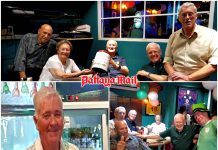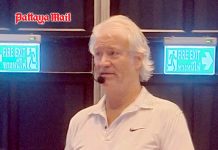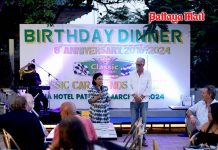Applying some of the principles of debate to common everyday situations can help one understand where the other person is coming from, says Douglas Campbell, who, in addition to being a Club member, is a former speech and debate coach. Doug spoke on the topic “From Fight to Argument to Debate” at the Pattaya City Expats Club meeting on Sunday, March 10.
He began by noting that we all have arguments with other people; we want to win these arguments; and we usually think we win because we tend to think we are always right. Doug said that perception is the way things seem as opposed to the way things are. He provided as an example that when he was a kid, his family visited the Grand Canyon. At a lookout, Doug’s grandmother marveled at what a wonderful thing God had created.
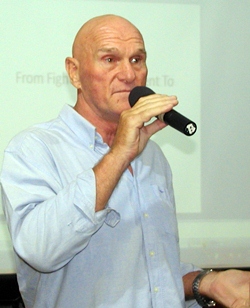 PCEC Member Chris Harman introduces long time friend Doug Campbell, a former speech and debate coach.
PCEC Member Chris Harman introduces long time friend Doug Campbell, a former speech and debate coach.
Another family arrived; the father took one look and said, “Jesus Christ, what a hole in the ground!” This anecdote relates what took place at a viewpoint; but it also shows how people can have different points of view. One’s point of view, Doug said, has to do with one’s values, upbringing and even brain chemistry; perception, colors, everything we see. He quoted Anais Nin, an American author, who said: “We do not see things as they are; we see things as we are.”
It is possible to understand another person’s point of view, Doug said, without having to accept it. He mentioned that there are three ways people disagree: (1) fight, (2) argument, and (3) debate. A fight does not usually resolve much, he explained.
Often irrelevant issues are raised, and there is usually no winner. A “fight” is an argument with no reasons provided, no rationale, he explained. A proper argument is one where reasons are advanced. A debate is a process where arguments with reasons are presented and there is an opportunity to rebut the other person’s arguments.
Doug said that there are three stages of debate: (1) the resolution (“Be it resolved that…), including a definition of terms; (2) the arguments, including cross examination; and (3) the rebuttals. In informal debates in which he has been involved, sometimes when he gets to the rebuttal stage he realizes that he doesn’t have any rebuttals – i.e. that the other person is right.
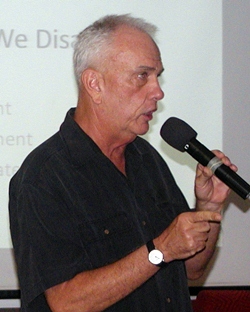 Doug began by noting that we all have arguments with other people; we want to win these arguments; and we usually think we win because we tend to think we are always right.
Doug began by noting that we all have arguments with other people; we want to win these arguments; and we usually think we win because we tend to think we are always right.
In his talk, Doug described some of the elements of a formal debate. Doug pointed out that a good debater, one who is skilled in active listening, should be able to “switch sides” and argue either the affirmative or the negative. In fact, he said, this is often required in formal debates. Doug concluded his talk with a quote from another American author, Joseph Chilton Pearce: “To live a creative life, we must lose our fear of being wrong.”
Douglas Campbell got his start in debating when he was in high school in the Alhambra School District in East Los Angeles. He has a B.A. in Speech Communications, a Masters in Education, and a Masters in Student Counseling. Doug retired from teaching in 2008. He has lived in Pattaya since 2010. He still keeps in touch with most of his former students, four of whom have already come to visit him in Thailand.
Master of Ceremonies Richard Silverberg provided an update on upcoming events and called on Roy Albiston to conduct the Open Forum where questions are asked and answered about Expat living in Thailand; Pattaya in particular.
For more information about the many activities of the Pattaya City Expats Club, visit their website at www.pattayacityexpatsclub.com.
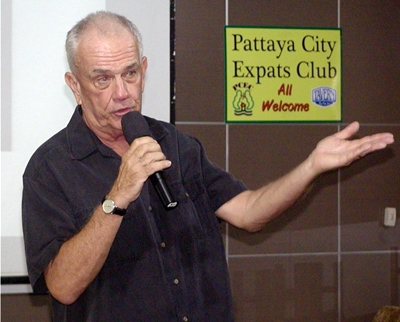 Doug responds to one of the many questions from PCEC members wishing to ‘debate’ his theses.
Doug responds to one of the many questions from PCEC members wishing to ‘debate’ his theses.
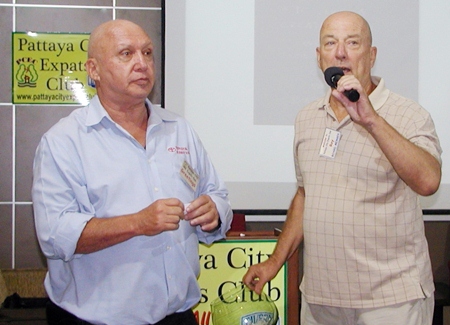 PCEC Board member Roy (R) and newest member Larry draw the winner of the raffle to provide PCEC with some new sound equipment.
PCEC Board member Roy (R) and newest member Larry draw the winner of the raffle to provide PCEC with some new sound equipment.


